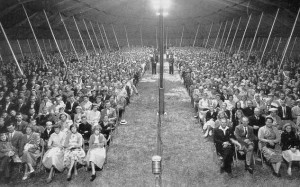 It is inevitable that iconoclasm, once enshrined as an operative principle, will, at times, need its own smashing. For instance, the fashionable contempt for “revival services” among many in the church today may itself need to be the object of contempt once it moves past a legitimate concern that we not reduce “revival” to a series of meetings and into a kind of haughty and wholesale abandonment of the very idea of a series of scheduled gatherings in which the people of God are called to gather in worship outside of the regularly prescribed times in a desire to see God move mightily.
It is inevitable that iconoclasm, once enshrined as an operative principle, will, at times, need its own smashing. For instance, the fashionable contempt for “revival services” among many in the church today may itself need to be the object of contempt once it moves past a legitimate concern that we not reduce “revival” to a series of meetings and into a kind of haughty and wholesale abandonment of the very idea of a series of scheduled gatherings in which the people of God are called to gather in worship outside of the regularly prescribed times in a desire to see God move mightily.
Central Baptist Church in North Little Rock last night concluded a series of revival meetings that lasted from Sunday morning to Wednesday night. We gathered for five meetings. Kevin Griggs preached on “The Kingdom of God and How It Changes Everything” and Scotty Kerlin led us in worship. Our people, young and old, showed up in an impressive display of support. We ate together, fellowshipped together, prayed, read, listened, and sang together. Lives were touched and, I truly believe, the church was strengthened.
Last night I was reflecting on my own self-righteous penchant for shrugging off the traditions of the faith family to which I belong and in which I was raised. In an effort to say that revival is more than a series of meetings, I have been guilty of dismissing meetings themselves at times. In an effort to say that revival is more than a calendared event, I have been guilty of smugly smirking at such calendared events.
To be sure, there is a danger to the revival meeting model. It can tempt us to think that this is how God moves: when we schedule Him in and give Him permission to do so. It can reduce the very idea of revival to a beginning-and-ending model in which we tragically come to think of it as an event, and a church event at that (i.e., “revival” started on Sunday and “revival” ended on Wednesday night). It can, if presented wrongly, foster the mistaken notion that the church is only the church when we gather here for things like this, mitigating against the more biblical teaching that the church is a body of believers, not an institutional presence.
I have felt the danger of these realities and, at times, have been tempted to abandon the traditional revival model. Even so, as a pastor I have never fully abandoned it, and, indeed, have no intention of doing so. I have gone through periods of calling it other things: “A Season of Renewal” and things like that. That’s fine and good. Calling it a “revival” is neither here nor there. No, the issue is not semantics. As I reflect on the meetings of this week, this, it seems to me, is the point: In a day in which modern American Christians, perhaps especially young modern American Christian, are fairly tyrannized by the calendars we have created, by the schedules we have allowed ourselves to embrace, by the myriad of activities to which we have committed, and by the constant pressure to keep up the frantic pace of our vertigo society, it could just be that the old school revival meeting model has taken on a new prophetic nuance in, by, and through which the church can reassert itself into the midst of the modern tapestry of busyness with a gospel presence and through which Christian people can offer a clear statement to the world, their families, and themselves, that sacred seasons of respite and congregational attention are still valid because the King around which we gather is still Sovereign.
“Here! Here!” for revival meetings.
Finally, here is audio of Scott Kerlin, Kevin Griggs, and Billy Davis, our Minister of Music, singing Paul Baloche’s song, “The Same Love.”
